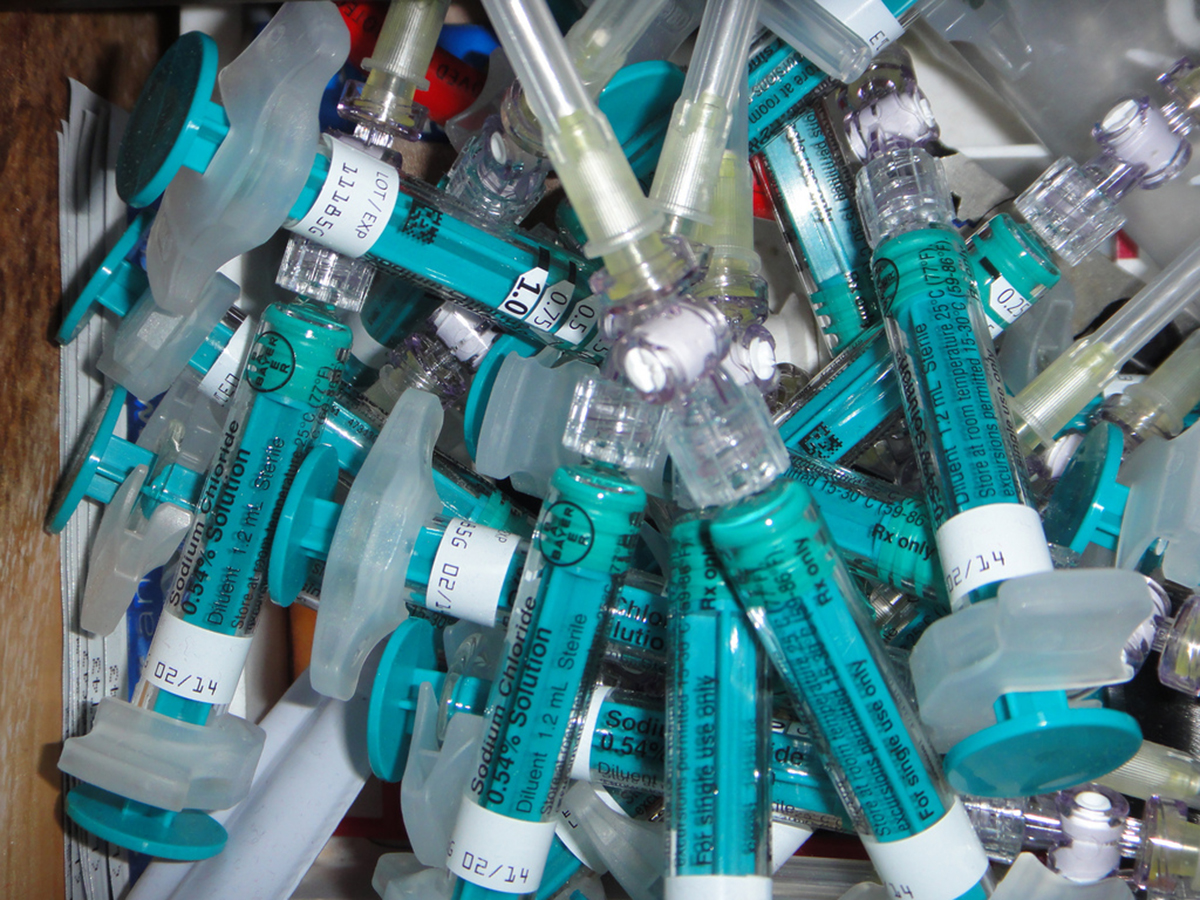Malignant melanoma is a serious type of skin cancer that may spread to other parts of the body. Aside from standard treatment which includes surgery and chemotherapy for advanced disease, interferon may be used as adjuvant therapy to improve a patient's chances for survival.
What is Malignant Melanoma?
Malignant Melanoma or melanoma is a condition where there is an abnormal growth and multiplication of the pigment cells (melanocytes) in the skin. This skin cancer may spread to adjacent lymph nodes and distant organs as well in its advanced stage. In the US, it is estimated that about 50,000 people are diagnosed with melanoma every year.
Caucasians and fair-skinned people who are regularly exposed to the damaging ultraviolet (UV) rays of the sun are at high risk of developing melanoma. A positive family history of the disease also increases one's likelihood for developing melanoma. Fortunately, since the skin is exposed to one's view, people are often able to notice changes in its color and appearance and early detection is therefore possible. Changes in the size, symmetry, color, shape, and texture of moles and other skin spots should alert one to consult a dermatologist to determine whether these are indicative of skin cancer.
Treatments for Melanoma
Early stages of melanoma may be treated by surgery alone. For early melanomas, surgeons remove the tumor plus one centimeter (or less than half an inch) of normal tissue around the lesion. However, for deeper and more advanced melanoma doctors may perform more extensive surgery, including removal of nearby lymph nodes. For advanced stages, such as when the cancer has spread to other parts of the body, additional (adjuvant) treatments like chemotherapy, radiotherapy, targeted therapy, and biological or immunotherapy are often recommended. Of these treatments, recent studies show that immunotherapy using interferons is effective in preventing a relapse of the disease after surgery. Some studies also show that interferon treatment may increase patients' overall survival.
How Interferon Works
Interferons are natural protein substances (cytokines) which the body produces to protect itself when threatened with an invading microbe or abnormal cells such as cancer cells. However, the amount of interferons naturally produced by the body may be inadequate, especially when the tumor cells have multiplied greatly and have affected other organs. The poor general health of the body and its immune system status may also be unable fight cancer.
Read More: Managing Hepatitis C with Interferon Therapy
Immunotherapy involves using medicines that stimulate the patient’s immune system to recognize and fight cancer cells effectively. Immunotherapy with synthetic interferons called interferon-alpha by injection to the skin helps shrink advanced tumors and prevent relapse of the disease.
Recent studies have delved into optimizing the duration and dosage of IFN-α as an adjuvant therapy. High doses for a shorter duration appear to be as beneficial as lower doses given over a longer period, but with reduced side effects. With the advent of novel therapies like checkpoint inhibitors and BRAF/MEK inhibitors, there have been comparative studies to determine the efficacy of IFN-α against these. Some research suggests that while checkpoint inhibitors might be more effective, IFN-α has a role, especially in patients with specific genetic profiles.
Advances in genomics and personalized medicine are paving the way for more tailored approaches. There's growing interest in identifying biomarkers that predict which melanoma patients would benefit most from IFN-α therapy.
Interferon treatment may be given in combination with other forms of adjuvant therapy such as chemotherapy or radiotherapy.
Side Effects Of Interferon-Alpha Therapy For Melanoma
Interferon alpha or interferon alfa-2b (Intron A) has been approved by the US Food and Drug Administration (FDA) as adjuvant therapy for melanoma in 1996. In spite of the promising effects shown by interferon therapy towards the improvement of patients with advanced melanoma, many doctors are hesitant to use it because of its toxic side effects. Naturally produced interferons usually produce symptoms such as fever, fatigue, muscle aches, joint pains and other flu-like symptoms as they act to fight disease. As adjuvant treatment for melanoma, interferon-alpha is usually given in high doses for greater effectivity. Interferon therapy is initially administered directly into the blood stream (intravenous) during the first or induction phase. This involves injecting interferon five days per week for a 4-week period, injection taking about 20-30 minutes.

The second or maintenance phase involves injecting interferon subcutaneously (in the skin) three times per week for the remainder of the year. Patients and/or their loved ones are taught to administer the subcutaneous injections themselves.
In many cases, side effects may diminish as the body gets used to the treatments. The common side effects of interferon therapy include flu-like symptoms such as headache, fever, chills, and body aches. Other common symptoms are fatigue, loss of appetite, nausea, and metallic taste in one's mouth. Less common effects include depression, mild hair loss, itchy skin, lightheadedness, and palpitations. Side effects may be reduced by adjustment in dosage of interferon. They are generally reversible when treatment is stopped. Resumption of treatments to a lower dose may be required.
In addition, some abnormalities may show up in the patient's laboratory tests with high-dose interferon. These include abnormal blood counts, liver enzymes, kidney function and thyroid function tests.
Patients must inform their doctors when side effects are severe or intolerable.
The question of whether to pursue interferon treatment as adjuvant therapy for advanced melanoma depends on every patient. They may be asked about how they value quality of life and their regard for relapse-free survival. A study involving melanoma patients who were candidates for interferon therapy showed that on the average, patients valued a 10% improvement in their chances for a 5-year relapse-free survival highly enough to ignore moderate to severe side effects from therapy.
Doctors must closely monitor the toxic effects which may harm the liver, kidney and thyroid functions of the patient and adjust doses accordingly.
Read More: Vitiligo Gene May Protect Against Deadly Malignant Melanoma
Pegylated Interferon-Alfa for Melanoma
Scientists have explored the possibility of using pegylated interferon-alfa (PEG-interferon alpha-2b), a chemically modified form of the interferon as adjuvant treatment for melanoma. They tried to find out whether the pegylated or longer-acting version of the drug can reduce side effects and improve survival, since it allows weekly self-administration, which could potentially improve the balance between benefit and toxicity. The study, which involved more than 1,200 stage III melanoma patients who have undergone surgery, showed that there was significant benefit for recurrence-free survival that was long-lasting, with acceptable levels of toxicity or side effects. However, the treatment did not improve over-all survival compared to the no-treatment (control) group. Furthermore, the occurrence of side effects using PEG-interferon-alfa-2b was similar to those of treatments using interferon-alfa-2b.
- Melanoma Center. Melanoma Staging and Treatment. http://www.melanomacenter.org/staging/types/interferon.html
- Gogas H, Ioannovich J, Dafni U,et al. Prognostic Significance of Autoimmunity during Treatment of Melanoma with Interferon. N Engl J Med 2006
- 354:709-718. http://www.nejm.org/doi/full/10.1056/NEJMoa053007
- Mocellin S, Lens MB, Pasquali S, et al. Interferon alpha for the adjuvant treatment of cutaneous melanoma. Cochrane Database of Systematic Reviews 2013, Issue 6. Art. No.: CD008955. DOI: 10.1002/14651858.CD008955.pub2. http://onlinelibrary.wiley.com/doi/10.1002/14651858.CD008955.pub2/abstract
- Medscape Medical News. Interferon Alfa for Malignant Melanoma: Is It Worth the Toxicities? http://www.medscape.com/viewarticle/703078
- American Cancer Society. Immunotherapy for melanoma skin cancer. http://www.cancer.org/cancer/skincancer-melanoma/detailedguide/melanoma-skin-cancer-treating-immunotherapy
- Photo by steadyhealth.com
- Photo courtesy of Jay Cross by Flickr : www.flickr.com/photos/antoniseb/6399596267/
- www.cancer.org
- www.melanomacenter.org
- www.nejm.org
- onlinelibrary.wiley.com
- www.medscape.com



Your thoughts on this